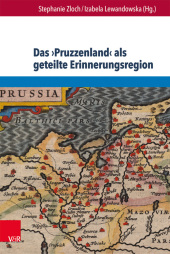 Neuerscheinungen 2014Stand: 2020-02-01 |
Schnellsuche
ISBN/Stichwort/Autor
|
Herderstraße 10
10625 Berlin
Tel.: 030 315 714 16
Fax 030 315 714 14
info@buchspektrum.de |

Izabela Lewandowska, Stephanie Zloch
(Beteiligte)
Das Pruzzenland als geteilte Erinnerungsregion
Konstruktion und Repräsentation eines europäischen Geschichtsraums in Deutschland, Polen, Litauen und Russland seit 1900
Hrsg. v. Izabela Lewandowska u. Stephanie Zloch
2014. 400 S. mit 30 Abbildungen. 23.5 cm
Verlag/Jahr: V&R UNIPRESS 2014
ISBN: 3-8471-0266-4 (3847102664)
Neue ISBN: 978-3-8471-0266-3 (9783847102663)
Preis und Lieferzeit: Bitte klicken
Grenzüberschreitungen: die Region "Pruzzenland" in europäischen Schulbüchern des 20. und 21. Jahrhunderts
Das ´Pruzzenland´ ist eine Region im nordöstlichen Europa, die von vielfältigen kulturellen und multiethnischen Traditionen, aber auch historisch von konkurrierenden nationalen Ansprüchen zwischen Deutschland, Polen, Litauen und Russland gekennzeichnet war. Die wohl weitreichendste Zäsur stellten die Verschiebung der nationalstaatlichen Grenzen und der nahezu vollständige Austausch der Bevölkerung im Gefolge des Zweiten Weltkriegs dar. In jüngster Zeit dient der Umgang mit der Vergangenheit als wichtige Ressource für die Suche nach regionaler Identität in Polen, Litauen und Russland. Für das Medium Schulbuch ist die vorliegende Studie in einem internationalen Vergleich über das 20. Jahrhundert hinweg bis zur Gegenwart erstmals Narrativen und Repräsentationen der Region nachgegangen, systematisch gebündelt in der Analyse von mental maps und sieben zentralen Topoi: die Pruzzen, Grunwald/Tannenberg/Zalgiris, Migration, Konfessionen, Persönlichkeiten, Wirtschaft und Gesellschaft und Landschaft.
Pruzzenland is a region in north-eastern Europe which has historically been influenced by a diverse range of cultural and multi-ethnic traditions and found itself the subject of competing territorial claims made by Germany, Poland, Lithuania and Russia. The alterations to national borders and the almost wholesale change in the region s population in the aftermath of the Second World War were doubtless the most profound ruptures and transformations faced by the area. In recent times, issues around remembering and coming to terms with the past have become crucial resources in the search for regional identity in Poland, Lithuania and Russia. This book, spanning the twentieth century and moving beyond it to the present day, represents the first attempt by research in this field to trace, and make an international comparison of, narratives and constructions of identities relating to a region as they appear in textbooks. The approach taken involves the analysis of mental maps and a focus on seven key topoi: the Pruzzen, Grunwald/Tannenberg/ algiris, migration, religions, personalities, the economy and society and landscapes.


